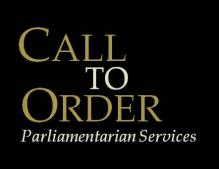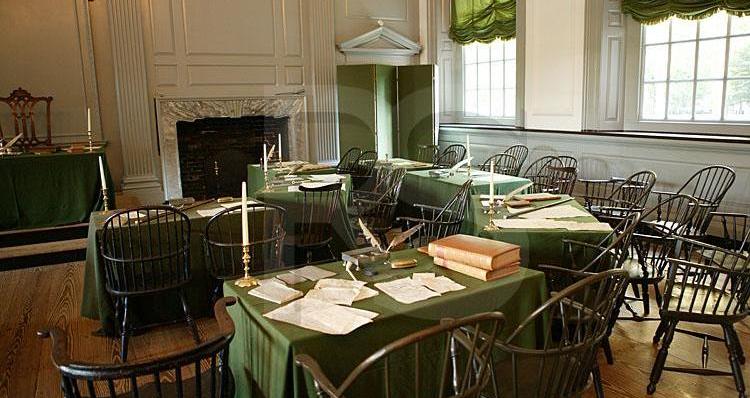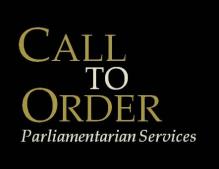In Mr. Smith Goes to Washington, the naïve Mr. Smith yields the Senate floor out of courtesy to a colleague, In doing so he loses his ability to debate on his legislation to prevent graft and corruption, Mr. Smith learned the hard way about the importance of knowing procedural rules. Officers and members of boards and and associations need to know the rules of order to achieve their goals and help their enterprises succeed. Our expertise includes:
- Meeting and Session Governance Services
- Presiding Officer Services
- Delegate Convention or Assembly Services
- Strategic Procedural Planning Services
- Bylaw Drafting, Review, and Revision Services
- Written Opinions Services
- Training Programs
Call out the sheriff! Legislators on the lamb!
Madison, WI -- Wisconsin Republican Governor Scott Walker needs to balance the budget, and he wants to do it by cutting spending and eliminating certain collective bargaining procedures of various government unions. His budget bill is being taken up by the Wisconsin State Senate where Republicans hold the majority of 19 to 14. But, fiscal bills require a quorum of three-fifths (60%) of the Senate members or 19.8 rounded to 20. Democrats have fled the state of Wisconsin to prevent a vote from being taken that they know they will lose.
The State Republican Senator Scott Fitzgerald made a motion for a call of the Senate. The motion for a call of the house in general parliamentary procedure requires, if adopted, the Sergeant at Arms lock to the doors of the assembly, after which a roll call is taken to find out who is present and more importantly who is absent without excuse. Those who are absent without excuse can be arrested and brought to the assembly. Generally, legislative bodies are the only types of assemblies that have the power to enforce a motion for a call of the the house. The Wisconsin State Senate has this authority. So now, 14 Democrat Senators are on the lamb and generally believed to be in Illinois.
The last time I can remember this happening was in Texas in 2004 when the Texas legislature was about to take a vote on the redistricting plan put together by the Republican controlled legislature. The Democrat members of the Texas legislature fled to Louisiana to prevent a quorum from being present and thereby stalling the plan from being implemented. (Needless to say, if the plan were implemented Democrats stood to lose some seats.) The Texas Rangers gathered up a posse to round up the fleeing legislators. You can't help but chuckle at the thought of a posse of Texas Rangers on horses chasing down those delinquent legislators!
The mere fact that a motion for a call of the house exists says something about us humans and the lengths that we're willing to go to have our way. Back at our nation's founding, one of the charges against King George in the Declaration of Independence was that "HE has called together Legislative Bodies at Places unusual, uncomfortable, and distant from the Depository of their public Records, for the sole Purpose of fatiguing them into Compliance with his Measures." Of course this was considered unfair. I wonder what the founders would say of the actions of either of the Wisconsin Democrats or the Texas Democrats?

© 2011 - 2014 Call To Order Parlimentarian Services
In the News
Independence Hall, Philadelphia,PA is where the Second Continental Congress debated and passed the Declaration of Independence, and where the Constitutional Convention debated and adoped the U.S. Constitution.

| Join Our Mailing List |
In Mr. Smith Goes to Washington, the naïve Mr. Smith yields the Senate floor out of courtesy to a colleague, In doing so he loses his ability to debate on his legislation to prevent graft and corruption, Mr. Smith learned the hard way about the importance of knowing procedural rules. Officers and members of boards and and associations need to know the rules of order to achieve their goals and help their enterprises succeed. Our expertise includes:
- Meeting and Session Governance Services
- Presiding Officer Services
- Delegate Convention or Assembly Services
- Strategic Procedural Planning Services
- Bylaw Drafting, Review, and Revision Services
- Written Opinions Services
- Training Programs
Ambiguous Bylaws leads to Court Loss for Condominium Association
The May 2014 Community Association Institute Law Reporter provided details of an Ohio Court of Appeals decision that found that because the bylaws of the Grand Harbour Community Owners Association were ambiguous regarding the association’s ability to charge a special assessment, a lower court erred in granting the Association a favorable summary judgment. That is, the Association’s Bylaws are ambiguous as to whether they provide the Association the authority for the assessment or whether the members must approve the assessment first.
The Grand Harbour Condominium Owners Association sought a special assessment of $1.3 million for the cost of a siding and roofing project. The members of the Association claimed that the assessment must be approved by them. The Association used two separate provisions to support their claim that they had the authority to charge the special assessment. The Appeals Court found that the first provision unambiguously failed to support their claim.
The second provision provides little better foundation and is at the heart of the ambiguity:
“Article IV, Section 2 of the bylaws states in pertinent part:
‘The Association’s powers hereinabove enumerated shall be limited in that the Association shall have no authority to acquire and pay for out of the maintenance fund any capital additions and improvements (other than for the purposes of replacing or restoring portions of the Common Areas and Facilities * * * ), having a total cost in excess of Ten thousand dollars ($10,000), in any twelve month period, nor shall the Association authorize any structural alterations, capital additions to, or capital improvements of the Common Areas and Facilities requiring an expenditure in excess of Ten thousand dollars ($10,000) in any twelve month period, without in each case the prior approval of the members of the association entitled to exercise the majority to the voting of the association * * *.’” Quoted from Koler v. Grand Harbour Condominium Owners Assn, 2014-Ohio-1299 (Ohio Ct. App. E-13-046, March 28, 2014).
The Appeals Court notes that the Association claims that the parenthetical statement “other than for the purposes of replacing or restoring portions of Common Areas and Facilities” gives grounds for the special assessment while the remainder of the same section seems to prohibit the Association from levying a special assessment above $10,000 without prior approval of a majority vote of the members. So which is it?
With that question, the Appeals Court concluded that there was ambiguity in the Bylaws, and therefore the lower court erred in granting summary judgment in favor of the Association. The case will now go back to the lower court for further proceedings.
This situation could have been avoided as would the incumbent expenditures in resources and goodwill within the community had the Association applied parliamentary procedures to the question of whether it had the authority to levy the assessment. Manuals of parliamentary procedure such as Robert’s Rules of Order Newly Revised, 11th ed or the American Institute of Parliamentarians Standard Code of Parliamentary Procedure leave it the members of the association in question to decide the meaning of any ambiguity.
If such a manual is the Association’s manual of parliamentary authority, then the members of the Association should have been given the opportunity to decide whether the proposed siding and roofing project fell within the meaning of the parenthetical portion or under the restrictive $10,000 limitation and thereby requiring a majority vote for the $1.3 million assessment. Once that question was decided, the rest becomes clear and the need for costly and resource consuming litigation would have been avoided.
The moral of the story: seek a parliamentarian to help with questions of interpreting bylaws.

In the News
Independence Hall, Philadelphia,PA is where the Second Continental Congress debated and passed the Declaration of Independence, and where the Constitutional Convention debated and adoped the U.S. Constitution.
